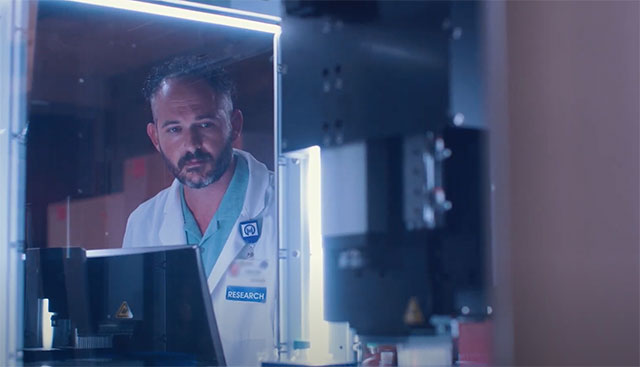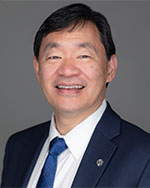
Promises of Cell Therapy Bring Opportunities for Collaboration and Clinical Excellence
Drop by drop, the infusion into Richard Jennings’ vein on May 25 marked more than one milestone. The 70-year-old from Sebastian, Florida, had been diagnosed with multiple myeloma in 2009 and subsequently endured multiple types of chemotherapy and even a stem cell transplant – only to see the blood cancer return. With this infusion, Jennings became the first patient at Moffitt Cancer Center to receive Abecma® after it became the first FDA-approved cell therapy for multiple myeloma.
But, to Jennings’ care team, this marked a different milestone: 500 Moffitt patients were treated with a type of personalized therapy called CAR T that reengineers a patient’s own T cells to combat cancer. Just six years before, Moffitt treated its first CAR T patient through a groundbreaking clinical trial.1 Jennings' landmark infusion represents Moffitt’s progress toward becoming a world leader in cell therapies for cancer.
"Our mission is to prevent and cure cancer, and I think cell therapies are going to be an extremely important way to do that," says Patrick Hwu, MD, president and CEO of Moffitt and a world-renowned researcher in tumor immunology.
A paradigm for clinical care
Frederick Locke, MD, is vice chair of the Blood and Marrow Transplant and Cellular Immunotherapy Department and co-leader of the Immuno-Oncology Program at Moffitt. He co-led a pivotal international clinical trial2 that resulted in the 2017 FDA approval of Yescarta®, the first CAR T therapy for patients with diffuse large B-cell lymphoma that recurred despite other treatments.
"We now have patients, who had no other viable treatment options at the time, who are in ongoing, complete remission six years later after a single infusion of CAR T cells," says Dr. Locke
While early responses to treatment were promising, it came with a number of risks: fevers, neurologic symptoms, even an inflammatory response called cytokine release syndrome that, left unchecked, could be deadly. Monitoring for and treating these toxicities led Dr. Locke to spearhead a coordinated effort to identify a centralized location for treating patients.
The resulting Immune Cell Therapy (ICE-T) unit opened in 2020, featuring 12 inpatient beds and eight treatment bays for outpatient visits, including the preparatory chemotherapy needed to make room for newly super-charged immune cells. Patients come to the same place – and see the same team – from start to finish of their cell therapy.
A safe haven for clinical research
The ICE-T unit is also the perfect setting to administer cutting-edge treatments only available to patients on clinical trials.
Currently, Moffitt is conducting 27 cell therapy clinical trials that may one day lead to FDA approvals and changes to standards of care for a variety of cancers. For example, one worldwide randomized trial led by Dr. Locke recently reported top-line results3 showing CAR T could be a safe and more effective treatment for certain lymphoma patients when used earlier in their course of care. Moffitt’s cell therapy clinical trial highlights include:
- CAR T for ovarian cancer. A team of researchers led by Robert Wenham, MD, chair of Moffitt’s Gynecologic Oncology program, will launch a CAR T clinical trial this fall for patients with recurrent ovarian cancer. Based on discoveries from the laboratory of José Conejo-Garcia, MD, PhD, chair of Moffitt’s Immunology Department and co-leader of its Immuno-Oncology Program, this CAR introduces follicle stimulating hormone (FSH) into T cells. The genetically modified CAR T cells then seek out and destroy cancer cells expressing an FSH receptor protein found on a large number of ovarian cancer cells.
- TIL for non-small cell lung cancer. A research team led by Thoracic Oncologist Ben Creelan, MD, conducted a phase 1 pilot study among 20 Moffitt patients with metastatic non-small cell lung cancer. TIL therapy reduced tumor size in most patients, with two showing no evidence of disease on their scans more than a year and a half after treatment.
- CAR T for adults with acute lymphoblastic leukemia (ALL). Medical oncologist Bijal Shah, MD, led a phase 14 and phase 25 trial of CAR T among adults whose ALL failed to respond to standard therapies. “We are seeing complete responses in a large number of patients, many still in remission a year or more after their initial CAR T cell infusion,” says Dr. Shah. “This is very promising given the historically poor outcomes we have had in this setting.”
- "Off-the-shelf” CAR T therapies. Using a patient’s own T cells to create custom CAR T treatment takes weeks. “off-the-shelf” versions of CAR T using T cells from a healthy donor could be manufactured, stored, and given to multiple patients with the same cancer diagnosis. Early-stage trials of two different allogeneic CAR T approaches led by Dr. Locke and Dr. Shah recently reported encouraging results.
- TIL for melanoma and more. TIL therapy is still experimental and production is complex; therefore, only a few centers including Moffitt currently offer this approach. For more than a decade, Shari Pilon-Thomas, PhD, and surgical oncologist Amod Sarnaik, MD, have been developing clinical trials of TIL therapies. Encouraging lifileucel clinical trial results reported a response rate of 36% for melanoma unresponsive to current FDA-approved treatments. The lifileucel biologics license application (BLA) submission to the FDA is expected to occur in the first half of 2022. Data from the Pilon-Thomas lab suggests TIL therapy is also feasible for patients with metastatic sarcoma. Adolescent and young adult sarcoma patients who have failed standard treatment are now being enrolled in an open phase 1 clinical trial to evaluate TIL therapy under the leadership of sarcoma surgeon John Mullinax, MD.

Identifying new targets for cell therapies
Finding ways to act on discrete targets on or within cancerous cells without affecting healthy cells is a key focus of several Moffitt research efforts
- Daniel Abate-Daga, PhD, and his team are working to create CAR receptors for several targets they have identified. The goal is to isolate T cell receptors that react to proteins on the cancer cell’s surface for TCR gene therapy, and to optimize the quality of lymphocytes to be expanded for TIL therapies.
- Researchers in the lab of Marco Davila, MD, are engineering safety mechanisms to ensure only acute myeloid leukemia (AML) cells are attacked. One approach is a CAR T therapy using two different CARs that target two separate proteins on AML cells. This CAR T only kills when both targets are triggered, thereby reducing damage to healthy cells.
- The Drug Discovery lab of Vince Luca, PhD, is working to generate antibodies that bind to markers found on triple-negative breast cancer cells but not on normal cells. These antibody fragments would ultimately be converted into new types of CARs by Dr. Hwu’s lab.
Reprogramming immune cells as ‘super soldiers’
Using gene-editing technologies like CRISPR, it is possible to remove any of an immune cell’s thousands of genes – or to insert new genes as well. One example from Dr. Hwu’s lab inserted a gene that helps the cell overcome defensive substances created by the tumor. Dr. Hwu likens it to “putting gas mask” on the T cells.
“Those immune cells that are resistant can go in there and do their job,” says Dr. Hwu.
Researchers in Dr. Abate-Daga’s lab are also studying the biology of certain immune cells that straddle the divide between innate and learned responses to invaders in the body – so-called unconventional lymphocytes. By understanding how gamma/delta T cells work, they hope to engineer them to enhance their response to tumors.
Understanding tumor microenvironment to take the brakes off the immune response
A tumor can change its microenvironment to protect itself against the immune system so that it can grow and spread. This often plays upon the healthy body’s natural safeguards against immune system over-response.
Researchers in the lab of Paulo Rodriguez, PhD, noted that tumor cells turn down a specific signaling pathway called Notch 1 in T lymphocytes, which weakens T cell response against the tumor. They have created models to strengthen Notch 1 signaling – and hopefully the T cells’ antitumor response. The models could be deployed during cell therapy production, as T cells are multiplied before being returned to the patient.
Manufacturing: The final step
Getting these new discoveries from the laboratory to the patient takes sophisticated manufacturing facilities currently under expansion at Moffitt.
Moffitt’s Cell Therapies Core (CTC), housed on the McKinley campus, opened in 2013 with 10 specially certified clean rooms where CTC staff have manufactured a variety of cell therapy products for use at Moffitt or at partner facilities globally. Under the direction of James J. Mulé, PhD, associate center director, Translational Science, Moffitt’s CTC became one of only five sites nationwide selected by the National Institutes of Health to support the advancement of diverse cell therapy research. An expansion project completed in April 2020 nearly doubled its size.
Plans are underway to open a Viral Vector Facility at Moffitt as soon as 2023. Viral vectors are used to introduce new targeting receptors into T cells before they are activated and multiplied in a cell processing facility through a tedious and exacting process. Few facilities nationwide can provide vector production, a bottleneck in delivering new cell therapies to current patients and developing future therapies. With its own viral vector and cell processing facilities, Moffitt will be able to attract biotech partners to help move new therapies through the development and regulatory pipeline.
In January 2020, Moffitt purchased a 775-acre property in Pasco County. Plans include creating a new “home” for a cell therapy innovation hub by developing a research park with collaborations with pharmaceutical and biotech companies, innovation incubators, and other partners.
“Building out the viral vector lab, expanding the cell therapies facility and fostering a biotech hub puts us in a position to actually take the ideas that we generate and put them into play – to move them to clinical trials and rapidly bring them to patients,” said Dr. Hwu.
Learn more about the cellular therapy program at Moffitt Cancer Center.
References:
- Locke FL, Neelapu SS, Bartlett NL, et al. Phase 1 results of Zuma-1: A multicenter study of KTE-C19 anti-cd19 car T cell therapy in refractory aggressive lymphoma. Mol Ther. 2017;25(1):285-295. doi:10.1016/j.ymthe.2016.10.020
- Neelapu SS, Locke FL, Bartlett NL, et al. Axicabtagene CILOLEUCEL car T-cell therapy in refractory large B-cell lymphoma. N Engl J Med. 2017;377(26):2531-2544. doi:10.1056/nejmoa1707447
- Locke FL, Miklos DB, Jacobson CA, et al. Axicabtagene CILOLEUCEL as second-line therapy for large B-cell lymphoma. N Engl J Med. 2021. doi:10.1056/nejmoa2116133
- Shah BD, Bishop MR, Oluwole OO, et al. KTE-X19 Anti-cd19 car T-cell therapy in adult relapsed/refractory acute lymphoblastic leukemia: Zuma-3 phase 1 results. Blood. 2021;138(1):11-22. doi:10.1182/blood.2020009098
- Shah BD, Ghobadi A, Oluwole OO, et al. KTE-X19 for relapsed or refractory adult B-cell acute lymphoblastic leukaemia: Phase 2 results of the single-arm, open-label, Multicentre Zuma-3 Study. Lancet. 2021;398(10299):491-502. doi:10.1016/s0140-6736(21)01222-8
If you’d like to refer a patient to Moffitt Cancer Center, complete our online form or contact a physician liaison for assistance. As part of our efforts to shorten referral times as much as possible, online referrals are typically responded to within 24 - 48 hours.
